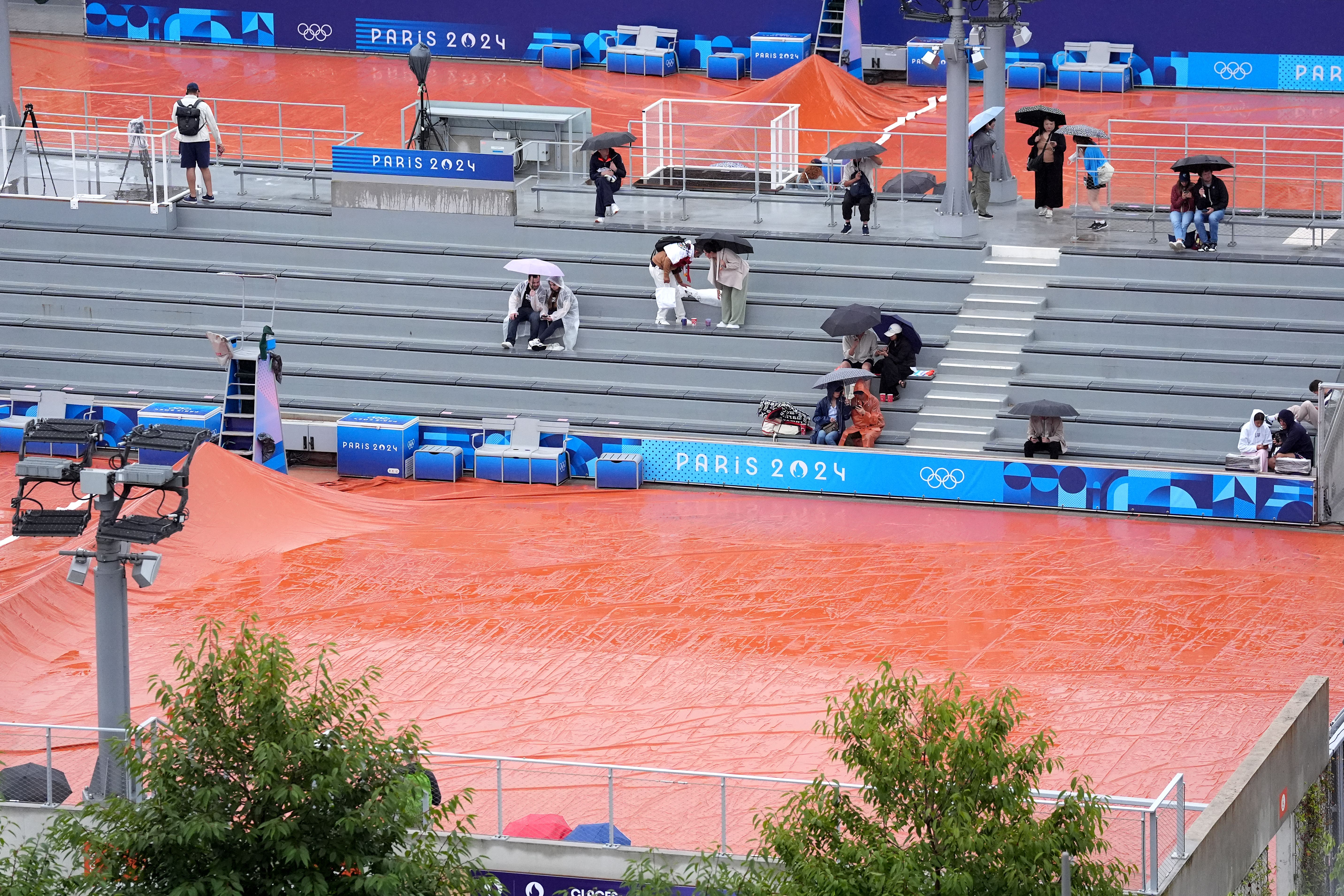The Paris rain continues at Olympics as cyclists struggle and sports delayed
The opening ceremony on Friday night was blighted by heavy rain.

Your support helps us to tell the story
From reproductive rights to climate change to Big Tech, The Independent is on the ground when the story is developing. Whether it's investigating the financials of Elon Musk's pro-Trump PAC or producing our latest documentary, 'The A Word', which shines a light on the American women fighting for reproductive rights, we know how important it is to parse out the facts from the messaging.
At such a critical moment in US history, we need reporters on the ground. Your donation allows us to keep sending journalists to speak to both sides of the story.
The Independent is trusted by Americans across the entire political spectrum. And unlike many other quality news outlets, we choose not to lock Americans out of our reporting and analysis with paywalls. We believe quality journalism should be available to everyone, paid for by those who can afford it.
Your support makes all the difference.Adverse weather conditions in Paris have led to the Olympic men’s street skateboarding being postponed by 48 hours, delays at the tennis and several crashes in the women’s cycling time trial.
An elaborate opening ceremony to officially get the Games under way on Friday was blighted by heavy rain, which refused to relent overnight and early into Saturday morning.
Skateboarding organisers have therefore been forced into a hasty rescheduling of the men’s street event, which was supposed to start on Saturday at midday but has now been pushed back to Monday.
Other events were also affected, with the start of play in the tennis on the outside courts delayed at Roland Garros.
While Court Philippe Chatrier and Court Suzanne Lenglen have roofs and were able to begin on time at midday, all the others were covered by orange tarpaulins.
British trio Jack Draper, Cameron Norrie and Dan Evans are scheduled back-to-back on Court Six and were among those forced to wait, with Katie Boulter also due to play outside on Court 11.
And in the women’s cycling time trial – in which Great Britain’s Anna Henderson won a silver – the damp, treacherous conditions found out several riders who came off their bikes.
The International Olympic Committee’s morning briefing was largely devoted to the events of Friday’s Opening Ceremony, which saw athletes “paraded” on boats on a six-kilometre stretch of the Seine before a grand finale at the Trocadero, highlighted by a comeback performance by Celine Dion and a hot air balloon cauldron raised into the night sky.
Thomas Jolly, the artistic director of the first modern Olympic curtain-raiser to take place outside a stadium, pointed to the Latin motto on the French captial’s coat of arms, saying: “We’ve been working for two years on the ceremony and yesterday morning we didn’t know we had an extra guest, the rain, but we have this phrase in Paris, Fluctuat Nec Mergitur (“tossed [by the waves] but not sunk”), and this is the spirit of Paris that got mixed with the spirit of the Olympics.
“This is how I looked at the rain, and also this sentence from Seneca, ‘we have to learn to dance under the rain’ and this is exactly what happened. Everyone was in the rain and we all stuck together to celebrate this shared humanity, and I believe in this.”
Paris 2024 president Tony Estanguet, meanwhile, pointed out the 6800 athletes who took part would have been caught under the same deluge in a stadium, and said many took advantage of the option provided for them to leaving early after the flotilla was done.
Ceremonies director Thierry Reboul revealed the weather resulted in his team “taking decisions almost by the second. We had to constantly change the show, deciding whether or not we could put some artists on the rooftops of the city.”
“Not a single artist decided not to do something, not a single one decided to stop. I want to congratulate them for being so courageous, especially our singer on the rooftop of the Grand Palais and also Celine Dion, who never, ever actually wanted to do that anywhere else but on the Eiffel Tower.”
Reboul said his team were connected to four separate weather reports in an attempt to monitor conditions in patterns as close as France’s neighbours and as far-flung as the United States.
He added: “Nothing could have prevented the rain, but indeed we actually monitored the weather the whole day. Ten times we actually thought that we could make do, and 10 times we realised that we were in a situation that couldn’t be forecast, so we had to adapt the ceremony to the weather.”